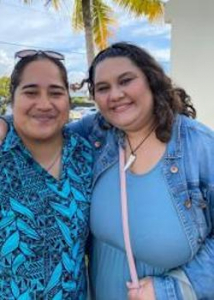
For more than a decade, the Thompson School of Social Work & Public Health at the University of Hawaiʻi at Mānoa along with its partner, the University of Guam, has been actively addressing the critical demand for social workers in Guam and the Federated States of Micronesia (FSM). Graduates of the master of social work (MSW) program are playing a pivotal role within their communities.

Joliene Hasugulayag, a graduate of the campus-based program, and Sylvia Elias and Letischa Edilyong-Reichhardt, graduates of the advanced standing distance education program, exemplify the positive outcomes of the program in fostering impactful social work professionals.
After completing her MSW in 2005, Hasugulayag worked as a medical social worker in Hawaiʻi, focusing on individuals living with HIV and AIDS. She returned to Guam, becoming a social work instructor at UOG, and is now working with the Guam VA Home-Based Primary Care Program.
Elias completed her social work internship under Hasugulayag, earned her MSW online and went on to work as a foreign service officer, supporting the next generation of social workers in FSM. She is currently a child protective specialist at the United Nations International Children’s Emergency Fund, managing child protection programs within FSM.
Edilyong-Reichhardt, influenced by her internship under Hasugulayag, became a medical social worker in a dialysis clinic in Guam, embracing a newfound passion for working with the elderly.
“I never gave much thought to joining the healthcare field,” Edilyong-Reichhardt said. “I didn’t even know that dialysis clinics had social workers! I also thought that I wouldn’t like working with the geriatric population and wanted to focus more on children and adolescents. UH encouraged me to step out of my comfort zone and explore other areas of social work. As it turns out, I love working in dialysis and with the elderly population.”
Navigating cultural challenges

Social workers, including those connected to FSM, encounter unique challenges due to diverse cultural perspectives. Edilyong-Reichhardt emphasized the importance of a learning dynamic between practitioners and patients, particularly in cultures where openly expressing feelings is sometimes discouraged.
Despite these challenges, the graduates are making strides in their roles, with Hasugulayag planning to publish on traditional cultural practices on Ulithi Atoll to enhance cultural understanding in social work education.
“My hope is that others can come to understand the underlying values associated with these customs, their function within the community/society, and the reasons why they are important,” Hasugulayag said. “I firmly believe that if people take the time to learn about the various cultures and peoples represented in our communities, they will find that there are more similarities than differences, that we are more alike than we may realize, and that we can celebrate these similarities while also embracing our differences.”
Read more about the Thompson School’s partnershp with UOG.
—By Maria Pou and Theresa Kreif

